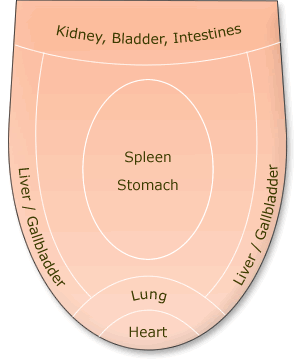top of page
Resources
Did you know that the tongue is a reflection of your inner health!
Tongue examination is one of the principle diagnostic tools used in Asian Medicine. Each of the major aspects of the tongue such as body color, shape, and coating indicate something about your inner health and the function of your organs. A normal tongue is light red in color, no cracks with a moist thin white coat. Below are some common examples of what to look for when viewing your tongue in good lighting.

* The tongue body color reflects the yin organs (heart, liver, lung, kidney and spleen), also the blood. If you have a pale tongue it could suggest a blood deficiency or your body runs on the cold side. Red tongue could mean heat and or stagnation inside the body. When blood flows through the body easily everyone is happy.
* We also look at the shape of the tongue along with the texture of the tongue. Here we're looking at excess, deficiency, wet and dry. One example is having cracks down the center of tongue and if in the stomach area could indicate dryness in the stomach. We also see a lot of teeth marks on the side of the tongue both suggest disturbance in the digestive systems.
* The tongue coat indicates heat or cold. For example if you have no coat with a red tongue this is usually heat, if deficient heat it shows up as hot flashes and or night sweats, if excess heat could be a fever. White thick coat reflects internal cold.
Here are some suggested dietary and eating practices.
Pale/white coat:
EAT MORE: sweet potato, soup, lightly cooked vegetables and easily digestible protein such as legumes and wild fish. Avoid eating in front of the TV or while looking at your phone! Eat regular meals at the same time every day and always have breakfast and chew your food well.
AVOID: raw, cold foods and iced beverages until digestion improves. Try cutting out wheat & dairy. No sugar is the key.
Red tongue/yellow coat:
EAT MORE: onion, cinnamon, basil, oregano, sage, adzuki beans, celery, and lettuce.
AVOID DAMP FOODS: milk products, sugar, alcohol, fatty & fried foods.
Dry/cracked tongue:
EAT MORE: warm water instead of cold, oats for breakfast, brown rice, millet, barley & barley water, mushrooms, flax seed and healthy fats.
AVOID: packaged foods, large meals and overeating, cigarettes (drying to the stomach & lungs).
Red tipped tongue:
EAT MORE: bitter/sour foods such as celery, spinach, cucumber, and green apples.
AVOID: stimulants, stressful television shows, fried foods, excess meats, cheese, eggs, peanuts & alcohol.
Do you want to know more about what your tongue? What is it trying to show you about your internal health? Call or text for an appointment today.
bottom of page